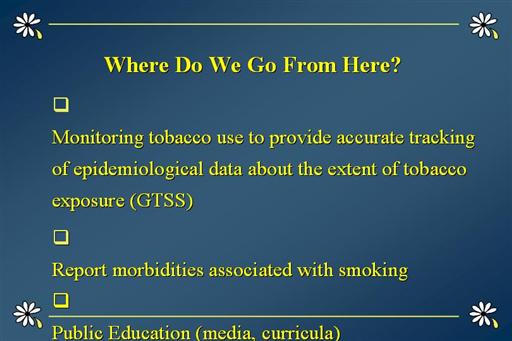| front |1 |2 |3 |4 |5 |6 |7 |8 |9 |10 |11 |12 |13 |14 |15 |16 |17 |18 |19 |20 |21 |22 |23 |24 |25 |26 |27 |28 |29 |30 |31 |32 |33 |review |
 |
Global Tobacco Surveillance
System (GTSS)
The World Health Organization (WHO),
the Centers for Disease Control and Prevention (CDC), and the
Canadian Public Health Association (CPHA) began development of the Global
Tobacco Surveillance System (GTSS) in 1999. The GTSS includes the
collection of data through four surveys: the Global Youth Tobacco Survey
(GYTS) for youth; the Global School Personnel Survey (GSPS); and the
Global Health Professions Students Survey (GHPSS) for adults. In 2007, a
fourth component was added: the Global Adult Tobacco Survey (GATS). The
new tobacco initiative is the result of a grant provided by the
Bloomberg Philanthropies in partnership with the Johns Hopkins Bloomberg
School of Public Health and the CDC Foundation.
The purpose of the GTSS is to enhance the capacity of countries to design, implement, and evaluate their national comprehensive tobacco action plan and to monitor the key articles of the WHO Framework Convention on Tobacco Control (WHO-FCTC).
• -
The GYTS focuses on youth aged 13-15 and collects information in
schools.
• -
The GSPS surveys teachers and administrators from the same
schools that participate in the GYTS.
• -
The GHPSS focuses on 3rd year students pursuing degrees in
dentistry, medicine, nursing, and
pharmacology.
• -
The GATS, a household survey, monitor tobacco use among adults.
|